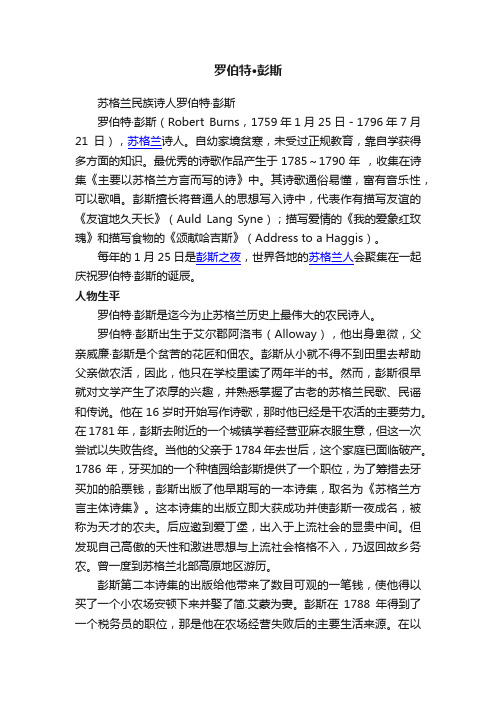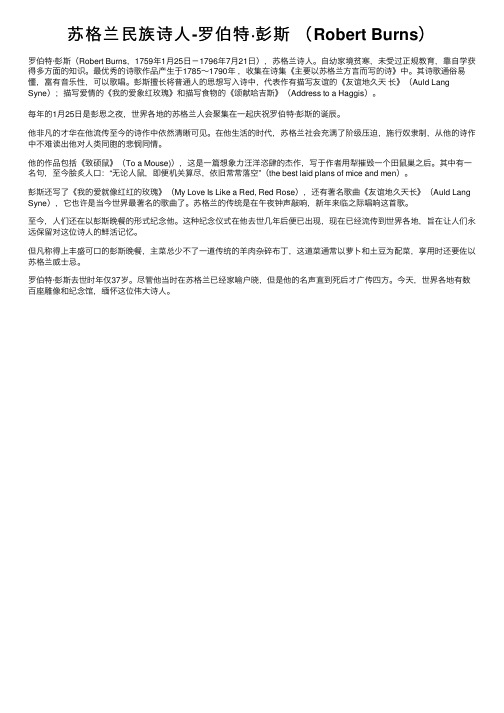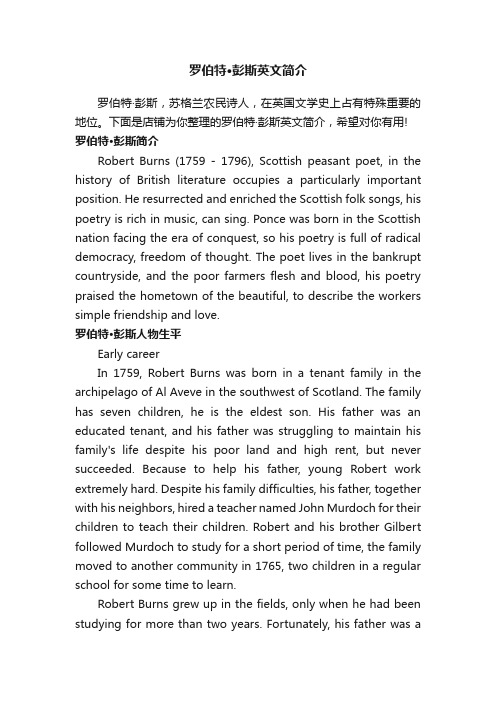Robert Burns 罗伯特彭斯
罗伯特·彭斯

罗伯特·彭斯苏格兰民族诗人罗伯特·彭斯罗伯特·彭斯(Robert Burns,1759年1月25日-1796年7月21日),苏格兰诗人。
自幼家境贫寒,未受过正规教育,靠自学获得多方面的知识。
最优秀的诗歌作品产生于1785~1790年,收集在诗集《主要以苏格兰方言而写的诗》中。
其诗歌通俗易懂,富有音乐性,可以歌唱。
彭斯擅长将普通人的思想写入诗中,代表作有描写友谊的《友谊地久天长》(Auld Lang Syne);描写爱情的《我的爱象红玫瑰》和描写食物的《颂献哈吉斯》(Address to a Haggis)。
每年的1月25日是彭斯之夜,世界各地的苏格兰人会聚集在一起庆祝罗伯特·彭斯的诞辰。
人物生平罗伯特·彭斯是迄今为止苏格兰历史上最伟大的农民诗人。
罗伯特·彭斯出生于艾尔郡阿洛韦(Alloway),他出身卑微,父亲威廉·彭斯是个贫苦的花匠和佃农。
彭斯从小就不得不到田里去帮助父亲做农活,因此,他只在学校里读了两年半的书。
然而,彭斯很早就对文学产生了浓厚的兴趣,并熟悉掌握了古老的苏格兰民歌、民谣和传说。
他在16岁时开始写作诗歌,那时他已经是干农活的主要劳力。
在1781年,彭斯去附近的一个城镇学着经营亚麻衣服生意,但这一次尝试以失败告终。
当他的父亲于1784年去世后,这个家庭已面临破产。
1786年,牙买加的一个种植园给彭斯提供了一个职位,为了筹措去牙买加的船票钱,彭斯出版了他早期写的一本诗集,取名为《苏格兰方言主体诗集》。
这本诗集的出版立即大获成功并使彭斯一夜成名,被称为天才的农夫。
后应邀到爱丁堡,出入于上流社会的显贵中间。
但发现自己高傲的天性和激进思想与上流社会格格不入,乃返回故乡务农。
曾一度到苏格兰北部高原地区游历。
彭斯第二本诗集的出版给他带来了数目可观的一笔钱,使他得以买了一个小农场安顿下来并娶了简.艾蒙为妻。
彭斯在1788年得到了一个税务员的职位,那是他在农场经营失败后的主要生活来源。
英美文学欣赏资料-v.2.robertburns

04
罗伯特·彭斯在英美文学中的地位和
影响
对后世作家的启示
描绘真实的社会现
象
彭斯的作品揭示了当时苏格兰社 会的种种弊端,为后来的作家提 供了观察和描绘社会现象的范本。
独特的诗歌风格
彭斯的诗歌风格质朴、自然,对 后来的诗人产生了深远的影响, 启发了他们追求诗歌的简洁与真 挚。
对人性的深入剖析
彭斯的作品中,通过对人性的深 入剖析,揭示了人性的复杂与矛 盾,为后来的作家提供了思考人 性的角度。
英美文学欣赏资料v.2.robertburns
• 罗伯特·彭斯的生平简介 • 罗伯特·彭斯的诗歌风格 • 罗伯特·彭斯的主要作品分析 • 罗伯特·彭斯在英美文学中的地位和
影响 • 罗伯特·彭斯的作品对现代社会的启
示
01
罗伯特·彭斯的生平简介
出生与家庭背景
出生地
苏格兰埃尔郡的一个小村庄。
家庭状况
ห้องสมุดไป่ตู้
对英语语言文学的贡献
丰富了英语语言的表达
彭斯的作品中使用了大量的苏格兰方言和俚语,丰富了英语语言 的表达方式。
开创了民谣诗体
彭斯创作的民谣诗体独具特色,成为英语诗歌中的一种重要形式, 为后来的诗人提供了创作灵感。
推动了英语诗歌的发展
彭斯的作品对后来的英语诗歌产生了深远的影响,推动了英语诗歌 的发展和创新。
其他重要作品
总结词
除了《苏格兰方言诗集》和《诗选》,彭斯还创作了 多部重要的作品,包括长篇小说、短篇小说、戏剧等 。
详细描述
彭斯的长篇小说《汤姆·奥贝德兰》是一部描绘苏格兰 农民生活的小说,通过对主人公汤姆的成长经历和人生 波折的描写,展现了苏格兰乡村的风土人情和农民的苦 难生活。彭斯的短篇小说集《约克郡故事》收录了多篇 以约克郡为背景的短篇小说,通过对当地人物和风土人 情的描写,展现了约克郡的历史和文化。此外,彭斯还 创作了多部戏剧,包括《约翰·安德森》和《修道院与 俗世》等。这些作品都展现了彭斯在文学创作上的多面 才华和深厚底蕴。
罗伯特-彭斯讲解学习

1783 began to write poetry. Published in 1786 "in the Scotland dialect and write poetry mainly concentrated collection", "dog", "a red red rose" "", "of mice induced by mountain Daisy", "to a louse" excellent Scotland Xing poem, spicy satirical poem "saint day bazaar", sing the praises of farmers and beautiful the nature of "farmers' Saturday night" and other poems. Poetry caused a sensation. He was invited to Edinburgh, become a common lady guest of honor, and met the Scotland ballad collector Johnson.
Scottish life( Scottish peasants) Patriotism
Burns’ attitude (liberty& equality & fraternity)
Robert Burns罗伯特 彭斯

By the age of 15, Burns was the principal laborer at Mount Oliphant. During the harvest of 1774, he was assisted by Nelly Kilpatrick, who inspired his first attempt at poetry, “O, Once I Lov‘d A Bonnie Lass”. In the summer of 1775, he was sent to finish his education with a tutor at Kirkoswald, where he met Peggy Thompson, to whom he wrote two songs, "Now Westlin' Winds" and "I Dream'd I Lay". In December 1781, Burns moved temporarily to Irvine, North Ayrshire, to learn to become a flax-dresser, but during the workers' celebrations for New Year 1782 the flax shop caught fire and was burnt to the ground. This venture accordingly came to an end, and Burns went home to Lochlea farm. During this time he met and befriended Captain Richard Brown who encouraged him to become a poet.
苏格兰民族诗人-罗伯特·彭斯

苏格兰民族诗⼈-罗伯特·彭斯(Robert Burns)罗伯特·彭斯(Robert Burns,1759年1⽉25⽇-1796年7⽉21⽇),苏格兰诗⼈。
⾃幼家境贫寒,未受过正规教育,靠⾃学获得多⽅⾯的知识。
最优秀的诗歌作品产⽣于1785~1790年,收集在诗集《主要以苏格兰⽅⾔⽽写的诗》中。
其诗歌通俗易懂,富有⾳乐性,可以歌唱。
彭斯擅长将普通⼈的思想写⼊诗中,代表作有描写友谊的《友谊地久天长》(Auld Lang Syne);描写爱情的《我的爱象红玫瑰》和描写⾷物的《颂献哈吉斯》(Address to a Haggis)。
每年的1⽉25⽇是彭思之夜,世界各地的苏格兰⼈会聚集在⼀起庆祝罗伯特·彭斯的诞⾠。
他⾮凡的才华在他流传⾄今的诗作中依然清晰可见。
在他⽣活的时代,苏格兰社会充满了阶级压迫,施⾏奴⾪制,从他的诗作中不难读出他对⼈类同胞的悲悯同情。
他的作品包括《致硕⿏》(To a Mouse)),这是⼀篇想象⼒汪洋恣肆的杰作,写于作者⽤犁摧毁⼀个⽥⿏巢之后。
其中有⼀名句,⾄今脍炙⼈⼝:“⽆论⼈⿏,即便机关算尽,依旧常常落空”(the best laid plans of mice and men)。
彭斯还写了《我的爱就像红红的玫瑰》(My Love Is Like a Red, Red Rose),还有著名歌曲《友谊地久天长》(Auld Lang Syne),它也许是当今世界最著名的歌曲了。
苏格兰的传统是在午夜钟声敲响,新年来临之际唱响这⾸歌。
⾄今,⼈们还在以彭斯晚餐的形式纪念他。
这种纪念仪式在他去世⼏年后便已出现,现在已经流传到世界各地,旨在让⼈们永远保留对这位诗⼈的鲜活记忆。
但凡称得上丰盛可⼝的彭斯晚餐,主菜总少不了⼀道传统的⽺⾁杂碎布丁,这道菜通常以萝⼘和⼟⾖为配菜,享⽤时还要佐以苏格兰威⼠忌。
罗伯特·彭斯去世时年仅37岁。
尽管他当时在苏格兰已经家喻户晓,但是他的名声直到死后才⼴传四⽅。
Robert Burns 罗伯特.彭斯PPT精选文档

He was encouraged in his self-education by his father, and his mother acquainted him with Scottish folk songs, legends, and proverbs.
6
Agnes Brown, Burns' mother
By permission of the National Galleries of Scotland
7
Arduous farm work and undernourishment in his youth permanently injured his health, leading to the rheumatic heart disease from which he eventually died.
songs to Scots Musical Museum (6 volumes,
1783-1803), a project initiated by the engraver and music publisher James Johnson.
Beginning in 1792 Burns wrote about 100
During the next two years he produced most of his best-known poems, including “The Cotter's Saturday Night,” “Hallowe'en,” “To a Daisy,” and “To a Mouse.” In addition, he wrote “The Jolly Beggars,” a cantata chiefly in standard English, which is considered one of his masterpieces. Several of his early poems, notably “Holy Willie's Prayer,” satirized local ecclesiastical squabbles and attacked Calvinist theology, bringing him into conflict with the church.
Robert Burns 作品

第三节中“我们曾经终日游荡在故乡的青山上”, 勾勒出儿时的欢乐;第四节,“如今却劳燕分飞, 远隔大海重洋”,写尽人世沧桑。两节形成鲜明 对比,引人对旧日时光的无限向往和遐想。第五 节描写就别重逢的喜悦,老朋友握手相聚,举杯 高歌,对往日的共同回忆消除了世事的沧桑和彼 此境遇变化带来的隔膜,有的只是对过去时光的 无限怀想和对友谊的无比珍视。如今,无论新朋 相聚,还是旧友重逢,“让我们举杯痛饮,同声 歌唱,友谊地久天长”, 在世界各地广为传唱。
John Anderson, My Jo
John Anderson my jo, John, 约翰 . 安德生, 我的老伙计,
When we were first acquent,
Your locks were like the raven,
忆当初你我初次相识,
你的头发乌又亮,
Your bonnie brow was brent;
• • • •
我们曾经终日游荡, 在故乡的青山上; 我们也曾历尽苦辛, 到处奔波流浪。
• We twa hae paidl’d in the burn • From morning sun till dine; • But seas between us braid hae roared, • Sin’ auld lang syne.
But now your brow is beld, John,
你的眉毛黑且浓;
而如今, 眉毛稀又疏,
Your locks are like the snow,
But blessings on your frosty pow, John Anderson, my jo!
头发白如雪。
祝你寿高且有好身体, 约翰 . 安德生,我的老伙计!
罗伯特·彭斯英文简介

罗伯特·彭斯英文简介罗伯特·彭斯,苏格兰农民诗人,在英国文学史上占有特殊重要的地位。
下面是店铺为你整理的罗伯特·彭斯英文简介,希望对你有用! 罗伯特·彭斯简介Robert Burns (1759 - 1796), Scottish peasant poet, in the history of British literature occupies a particularly important position. He resurrected and enriched the Scottish folk songs, his poetry is rich in music, can sing. Ponce was born in the Scottish nation facing the era of conquest, so his poetry is full of radical democracy, freedom of thought. The poet lives in the bankrupt countryside, and the poor farmers flesh and blood, his poetry praised the hometown of the beautiful, to describe the workers simple friendship and love.罗伯特·彭斯人物生平Early careerIn 1759, Robert Burns was born in a tenant family in the archipelago of Al Aveve in the southwest of Scotland. The family has seven children, he is the eldest son. His father was an educated tenant, and his father was struggling to maintain his family's life despite his poor land and high rent, but never succeeded. Because to help his father, young Robert work extremely hard. Despite his family difficulties, his father, together with his neighbors, hired a teacher named John Murdoch for their children to teach their children. Robert and his brother Gilbert followed Murdoch to study for a short period of time, the family moved to another community in 1765, two children in a regular school for some time to learn.Robert Burns grew up in the fields, only when he had been studying for more than two years. Fortunately, his father was ahardworking farmer, but he also understood the meaning of knowledge for the children. At night, after the heavy labor was over Personally teach Burns grammar and theological knowledge. After the age of 12, Ponce went on to school far away from home, learning English and learning fine French. He is a collection of books, astronomy and geography, all the literature are all dabbled.In 1777, they moved again, but the family did not improve. In 1784, Robert's father died, Robert moved to the home of the Moclin parish of the city of Moscow. At that time, he had a strong interest in sectarian politics, he supported the liberal view, against the orthodox Calvin sect. He has begun to create poetry, he wrote the poem in the notebook, but also added a comment on his poems.Ponce loves a woman named Jean Amer, who is going to marry in 1786. However, Jean's father did not agree with Ponce, and prevented them from getting married, largely because of the young man's view of non-orthodox religion. In the same year, a pair of twins from Jean and Robert were born, and this was the first two of their nine children. Later, Burns began to marry with Mary Campbell ("Plateau Mary"), intended to marry and emigrate to Jamaica, but Mary died at birth.During the period, Burns published his first work "Scottish Dialect Poems" (1786). The success of the collection made him abandon all the plans to leave Scotland. Instead, he went to Edinburgh and became a celebrity in social and literary circles. In Ireland and the United States, his writings were pirated printed, which made him an international celebrity. In 1787, he traveled in Scotland in the summer and winter in Edinburgh in winter. The following year he married Jean Amor, settled in a farm in Ellisland,near Dumfries.Old age deedsAlthough Ponce is a famous poet, but he earned from the poetry of the money is very few, and farming is clearly not make any money. In 1789 he received a tax inspector's job, and in 1791 the family moved to Dumfries. In 1792 he was scrutinized by government officials for his strong sympathy for the French revolution. He was only condemned, in any case or to keep the job.During the Ellisland farm and later Dumfries, Burns continued to cast poems into several Scottish and English magazines and newspapers. However, the most important thing he did during this time was to collect, edit and sort out Scottish folk songs. From 1787 until his death, he helped to edit James Johnson's "Scottish Music Museum" (1787-1803). In the last three years of his life, he collaborated with George Thomson to create the "Select Collections of Original Scottish Airs" (1793-1814).Many of Penrose's early biographers believe that excessive drinking and life debauchery caused him to die young. More recently, there is evidence that Burns, despite his seemingly energetic - his heart injury caused by excessive labor in his farmland in childhood has never been fully recovered.Near the age of 40, Burns suffers from rheumatic fever and deteriorates to a severe fatal heart disease. He was buried in the tomb of Dumfries. His friends helped his family by subscribing to his published poems.罗伯特·彭斯人物经历In 1783 Ponce began writing poetry. Published in 1786, "mainly used in the Scottish dialect written poems", focused on "two dogs", "a red roses" "to mice", "to the mountain daisies","lice" and other excellent Scotland Than the poem, spicy satirical poem "holy festival market", praised the peasants and the beautiful nature of the "farmers Saturday night" and other poems. Poetry poses a sensation. He was invited to Edinburgh, became the name of the ladies of the guest, and met the Scottish song collector Johnson. Soon returned home.In 1788, Peng Si got the staff of the Inland Revenue Department, in 1789 to seek a small tax officer's office, every week to ride to work. He was inspired by the days of his journey, and in a letter to his friend, he wrote Auld Lang Syne.(1787-1808), edited the six volumes of the original Scottish song anthology (1793-1818) for Thomson's editorial of the six-volume Scottish Music Collection (1787-1808) ), So that many will be lost folk songs to be preserved. For a lot of songs to fill the lyrics made him famous in the world. Later, the main poems are folklore-based narrative poem "Tom Otant", write a story of the night of torturers. Another poem "happy beggar" to write a group of men and women Rangers to find pleasure. His works are honest, lively, showing the pursuit of freedom and equality. At the same time, its earliest creation of the Scottish folk song "friendship for a long time long" as the film "soul blue bridge" theme song, has been people sung.On January 25 each year, the Scottish people will hold a grand celebration to commemorate the romantic poet.。
- 1、下载文档前请自行甄别文档内容的完整性,平台不提供额外的编辑、内容补充、找答案等附加服务。
- 2、"仅部分预览"的文档,不可在线预览部分如存在完整性等问题,可反馈申请退款(可完整预览的文档不适用该条件!)。
- 3、如文档侵犯您的权益,请联系客服反馈,我们会尽快为您处理(人工客服工作时间:9:00-18:30)。
Robert Burns (1759-1796)
Zhengboren
INTRODUCTION
Robert Burns, Scottish poet and writer of traditional Scottish folk songs, whose works are known and loved wherever the English language is read.
Agnes Brown, Burns' mother
By permission of the National Galleries of Scotland
Arduous farm work and undernourishment in his youth permanently injured his health, leading to the rheumatic heart disease from which he eventually died.
He went in 1781 to Irvine to learn flax dressing, but when the shop burned down, he returned home penniless.
He had, meanwhile, composed his first poems. The poet's father died in 1784, leaving him as head of the family. He and his brother Gilbert rented a farm, but the venture proved a failth-century scholar and educationalist J. S. Blackie summed up Burns's importance to Scotland and the Scots with the words:
'When Scotland forgets Burns, then history will forget Scotland.'
Birthplace of Robert Burns
Alloway
EARLY LIFE—“A very poor man’s son”
Burns was born on January 25, 1759. He was the eldest of seven children born to William Burness, a struggling tenant farmer, and his wife, Agnes Brown.
Although poverty limited his formal education, Burns read widely in English literature and the Bible and learned to read French.
He was encouraged in his self-education by his father, and his mother acquainted him with Scottish folk songs, legends, and proverbs.
Auld Lang Syne
Robert Burns is the best known of the poets who have written in Scots. His poem
Auld Lang Syne is often sung at Hogmanay.
His memory is celebrated by Burns clubs across the world; his birthday is an unofficial "National Day" for Scots and those with Scottish ancestry, celebrated with Burns suppers. Robert Burns was born into a farming family at Alloway in Ayrshire in 1759. He died in Dumfries at the early age of 37. Yet in that short time he had taken the Scottish literary world by storm, and had secured a place for himself in history and in legend.
FIRST VERNACULAR POEMS
In 1784 Burns read the works of the Edinburgh poet Robert Fergusson. Under his influence and that of Scottish folk tradition and older Scottish poetry, he became aware of the literary possibilities of the Scottish regional dialects.
